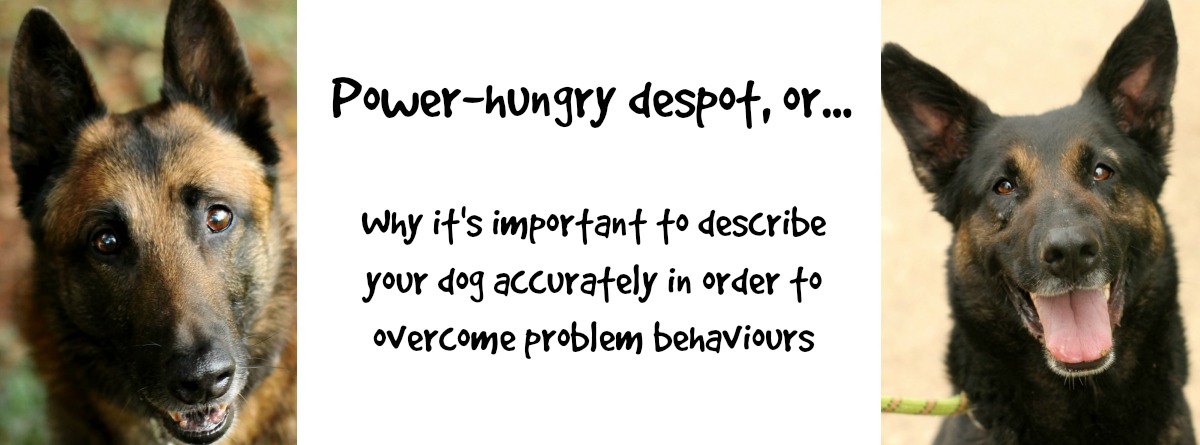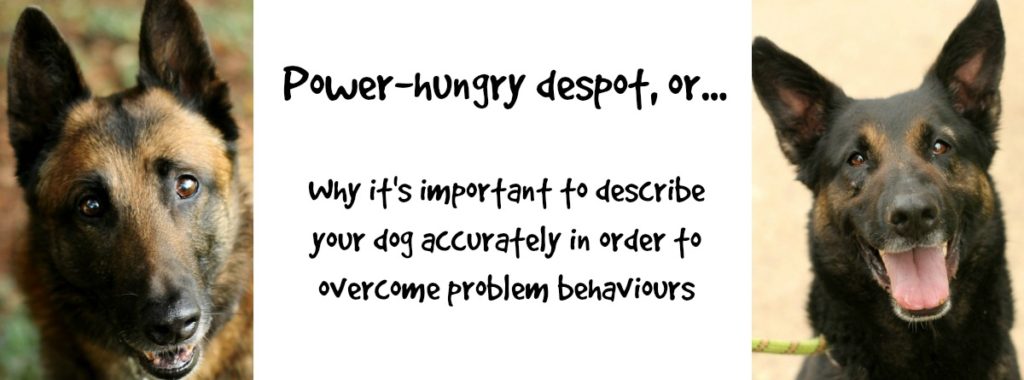Imagine the scene: your sister has been having some mental health issues. She’s ended up in hospital and she’s incoherent, delirious even. The doctors are relying on you to give a description of her behaviours in order to make an effective diagnosis. They’re not sure if she’s suicidal or psychotic and what you say is going to be the only evidence they have in order to decide what’s wrong and treat her.
“So, Emma, can you tell me what’s wrong with your sister?”
“She’s crazy! She’s just absolutely crazy!”
“And what does that look like?”
“Well, she does crazy things, you know. She says crazy stuff!”
And every time the doctor asks you to be more specific, you just tell them that your sister is crazy. They can only deduce that she is psychotic and they keep her on a high level of haloperidol until they can talk to her themselves.
When they ask you to describe “crazy”, you might tell the doctors that she counts cars compulsively, that she has to check she has locked the house up fifteen times. Or you tell them that she is counting calories and that she is obsessed with fat grams, that she has dropped 50kg and her knees are fatter than her thighs. Maybe you tell them that she’s been spending money like no tomorrow, that she quit her job, that she seems to be taking lots of risks. Or you tell the doctor that she never comes out any more, that she talks constantly of death, that she has stopped taking care of herself.
Under that umbrella of “crazy” are lots of more helpful ways to describe human behaviours that would help a psychiatrist make a better decision about treatment and would lead to better results.
It is no different with our animals. They are in a powerless position where their treatment for problems relies on our effective description of their behaviour. Telling a behaviouralist or trainer that your dog is dominant or “has to be the Alpha” is as effective as telling the psych team that your sister is crazy. Precision and accuracy are vital in order to find safe strategies to eliminate, reduce or diminish the power of unwanted behaviours. Describing your dog’s personality (rather than their behaviour) and saying “they’re dominant” means that is impossible to identify exactly what is causing the behaviour and how to eradicate it.
Perhaps you find a trainer and you describe your dog’s behaviours to them. If your trainer tells YOU that your dog is dominant or needs punishment-based training, well, think of it a bit like those quacks who used to drill holes in people’s heads to let the crazy spirits out, to stop migraines or to cure them of seizures. Yes, people believed it. Yes, people let them. Who knows – it might have even been efficient had those things been caused by a subungual hematoma. But just because we assume the mantle of the expert doesn’t mean that our expertise dates from this century, or even that it’s based on actual sciencey stuff. Imagine if you gave a detailed and objective description of your sister’s behaviour and the quacks said “She’s clearly quite crazy. We’re going to try a lobotomy.”
So when you tell me your dog is dominant, what would be a more useful description?
With humans
Does your dog not follow commands when you ask? Does your dog do things you don’t want them to do when they are not supervised? Are they “pushy” when seeking attention? Do you have problems because they want to play when you are tired or when it’s not appropriate play time? Do they sit or lie in places you don’t want them to sit or lie? Do they dash out through the door the moment it is opened? Perhaps they don’t have good manners and push past you to go first? Are they growling, barking or snarling if they are with you and someone else approches? Do they protest at bedtime? Do you have a hard time clipping nails, taking them to the vet or grooming them? Does your dog jump up to greet you or when they are excited but you don’t want them to? Are they difficult to walk on a lead? Do they nip people in play or when they are over-stimulated? Do they nip at your ankles? Are they troublesome when people leave or arrive? Do they turn into a snarling menace when anyone goes near their food bowl? Do you find it hard to get a toy from them or get them to “leave” or “drop” something?
Are they unfriendly with strangers? If someone comes onto the property, do they bark, snap and snarl? Is your dog a fence-line runner, chasing off passers-by? Do they shout at the post van? Are they a car chaser? Are they over-excited with guests, smothering them with love and jumping all over them? Are they afraid of strangers, running and hiding from them?
Is your dog having problems if you grab his collar or if you touch a particular part of his body? Are you worried he might take the vet’s hand off at their next dental check-up? Are they mouthy like puppies, putting your hand in their mouths, or your forearms? Do they take a treat like food’s going out of fashion? Are they jumpy if you touch them? Is your dog having issues around children?
With other dogs
Is it dogs in your household or unfamiliar dogs?
Do you mean they are over-stimulated when they meet another dog? Is this just when they are on a lead or when they are off it as well? Do they bark at other dogs they see on a walk? Do you find it hard to get past dogs who are running along fences barking? Do they ‘go in too hard’ to doggie meet-and-greets, sniffing and smelling, perhaps humping or trying to mount the other dog? Are they male and aggressive towards other uncastrated males? Are they over-excited to see another dog, yipping and bouncing, trying to get to them? Are they staring at other dogs or have ‘hard’, stiff bodies when other dogs are about? Do you have a hard time trying to get their attention if they can see another dog?
Do they not like it when other dogs get in their space or when other dogs have unrefined greeting skills? Do they show their teeth to new dogs if the other dog gets too close? Perhaps they seem afraid of other dogs or avoid greeting them? Do they seem really antisocial and not want to play with other dogs? Are they fussy about which dogs they are friends with? Do they bark, growl or lunge until the other dog is far enough away?
Perhaps your dog singles out another dog and makes a beeline for them? Do they harass or are they rough with particular other dogs who are clearly not enjoying it?
Maybe your dog has problems with play, always ending in a fight? Do they start nice and end nasty? Do they get frustrated with other dogs who don’t want to play or who stop play? Do they find it hard to know when play is over and end up getting snapped at by other dogs?
Are they resource-guarders around other dogs? Do they show their teeth or snap at any dog who gets too close when they have a toy? Do they have problems if other dogs approach their food bowl whilst they are eating? Do you feel you have to feed your dogs separately because a fight might easily break out? Does your dog get “jealous” if another animal is getting your attention and they are not?
Is your dog a compulsive fighter, never giving ground or letting up? Are they scrappy and unable to back off? Despite great socialisation with 50+ dogs, are they still compulsive fighters?
Have your dogs become increasingly bad tempered as they’ve got older? Are they snappy when they’ve been woken up or disturbed? Has your previously bomb-proof dog suddenly got issue with another dog in the household?
These are a good hundred ways to better describe your dog’s behaviour. All of these behaviours are ones that good behavioralists and trainers will be able to help you address or overcome with positive training methods. You’ll no doubt find that your dog doesn’t have just one simple unwanted behaviour – how great would that be?!
In describing behaviours more neutrally and clearly rather than describing your dog as “dominant” or “an alpha”, you’ll find common approaches to help you address the issues at hand. A good dog trainer will help you prioritise the behaviours you want to address and will give you strategies to help you overcome them, other than “being a pack leader” or “having a calm assertiveness”. Modern dog trainers see that both owner and dog must do things differently, and overcoming a dog’s behavioural issues is something you do with the dog, not to the dog.
Going back to your sister waiting for assessment… imagine that you describe these behaviours to a psychiatrist in minute detail on your sister’s behalf, and they decide that the treatment is a frontal lobotomy or electro-shock treatment, or even drilling a hole in her head. Though you know that the people in white coats are supposed to be experts, you still worry about the efficiency of such treatments. “Aren’t they a little old fashioned and barbaric?” you ask. “Well, they are things we’ve been doing for a very long time and although they may seem cruel, it’s for the best. There are thousands of years of practice behind this method. People have been doing it since we lived in caves! It must be effective, otherwise we wouldn’t keep doing it.”
Do you still go along with what the doctors say, despite your nagging doubts?
This is why, when you describe your dog’s behaviours effectively to your dog trainer, know that you should not be afraid to check whether your dog trainer or behaviouralist has a modern, scientific approach that is based on effective and humane treatments. Just because they’ve chosen to call themselves an expert doesn’t make them so. And a modern dog behaviouralist, even one who believes in dominance theory, will still ask you to explain what you mean more exactly.
We should strive to describe our dog’s unwanted behaviours more carefully. To do so means that we can avoid situations in which our dogs are likely to fail and we can find solutions that actually work. When we see problems with our dogs as behaviours rather than personality, we give them hope for improvement. Behaviour is transitory, reactive and circumstantial. A personality is set in stone. To me, describing a dog as “dominant” is as helpful as calling them an arsehole or a tin-pot dictator.
Instead of ‘diagnosing’ them with an ugly personality, isn’t it more helpful to think of them having some behaviours we don’t like and we can change? After all, dogs are not power-hungry despots and there are better explanations about why we see the behaviours that we do, as you’ll know if you’ve these posts about why dogs aren’t trying to rule your life and why dogs aren’t trying to get one over on every other dog they meet.
In my head these days, when I hear people say “my dog is dominant”, I’ve just replaced “dominant” with “arsehole”. And anyone who calls their dog an arsehole, well… I’m pretty sure both that dog and I know who the real arsehole is.


